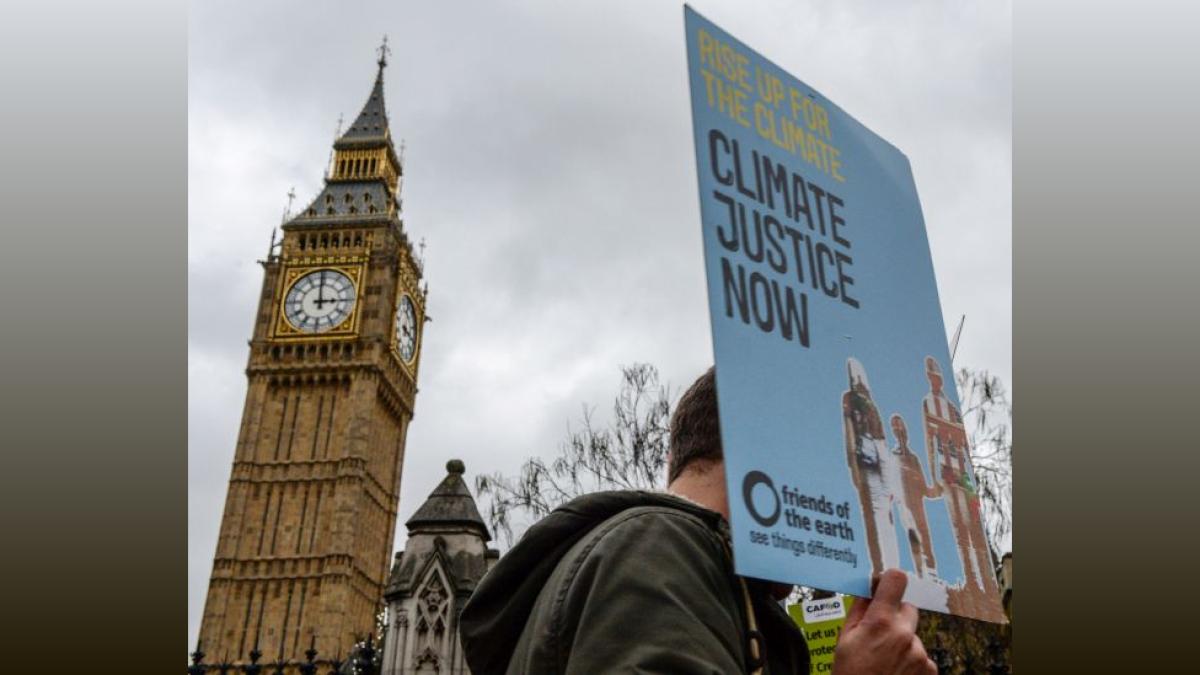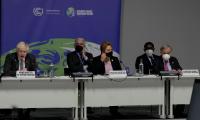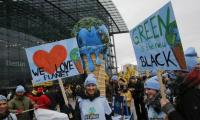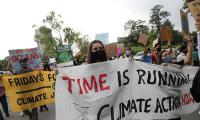OPEC 'Panicking' as COP28 Climate Talks Focus on Fossil Fuel Phase-out
OPEC urges members to block any fossil fuel phase-out language at COP28, sparking controversy as negotiators push for ambitious climate action.

Dubai, Dec 9 (AP) Veteran negotiators at the United Nations climate talks on Saturday said that the push to wean the world from dirty fossil fuels had gained so much momentum that they had poked a powerful enemy: the oil industry.
Late Friday, multiple news sources reported that the leader of OPEC, the powerful oil cartel, wrote to member countries earlier this week urging them to block any language that would phase out or phase down fossil fuels.
The news had the effect of a thunderclap, shinning a light on host and petrostate United Arab Emirates, which clearly has oil interests but also wants to show the world that it can lead the conference toward a substantive result.
Environmental activists, still smarting after decades of soft power from oil interests keeping such discussions from seeing the light of day, smirked at signs that the mighty cartel was circling the wagons.
I think they're panicking, said Alden Meyer, an analyst with climate think tank E3G Maybe the Saudis can't do on their own what they've been doing for 30 years and block the process.
Former Ireland President Mary Robinson said, They're scared. I think they're worried.
Robinson, co-chair of the retired leaders group The Elders, is now a prominent climate campaigner. She said that OPEC is concerned gives me hope.
Last month she clashed publicly with the president of the COP28 negotiations, Sultan al-Jaber, who is also CEO of the Emirates' national oil company.
Germany's climate envoy, Jennifer Morgan, suggested any call for blocking a deal would be felt most by small countries vulnerable of sea level rise caused by global warming.
Right now, countries here are fighting for their lives. The small islands, and most countries here, are engaging very actively on this discussion in a real way, she said in an interview. And I think it is obviously not responsible to have a position that could mean would mean the life and death of many million people.
But not all developing countries felt the same way.
The development of our countries depends, in fact, on the use of fossil fuels," said Niger's Issifi Boureima, who's executive secretary of the Sahel Region Climate Commission. It's not easy for countries like ours to accept a text that agrees to end fossils fuels today. It's not easy, because what do we do after that?
"I think that in the dynamic of multilateral diplomacy, we need to avoid egoism, egoism of the north towards the south.
COP28 Director General Majid al-Suwaidi downplayed the OPEC letter, saying the UAE team running the climate conference has been meeting with negotiators to get an ambitious deal. The oil cartel has no formal link to the climate negotiations.
I feel confident that we're going to get a good result you're going to be surprised about, Suwaidi told The Associated Press.
OPEC didn't immediately respond to messages seeking comment. Protestors Saturday in a flash mob briefly blocked the OPEC exhibit at climate talks, calling for an immediate phase-out of fossil fuels.
As discussions were happening about the letter and how to transition from fossil fuels, the world inched closer to deciding where next year's climate conference will be held, a third state petrostate. Azerbijian announced it would host COP29 in Baku, where one of history's first oil fields sprung up. But UN officials said it wasn't quite a done deal because the proper paperwork hasn't been submitted.
The conference presidency has been crowing about deal after deal, many of them involving hundreds of millions or even billions of dollars of pledges, but they've more nibbled the edges of the key issue of cutting emissions. When it comes to reducing the gases that cause climate change, a key group of scientists who analyse pledges, actions and potential temperature increases said in a report on Saturday that all the action hadn't amounted to much.
The COP28 Presidency has made a very big deal about a whole lot of voluntary initiatives, while adopting an ambiguous and weak position on the central issue of a fossil fuel phaseout, Climate Analytics CEO Bill Hare, co-author of the report, said.
Saturday's firestorm of controversy came as protests at the conference center in Dubai ramped up, with a Global Day of Action urging nations to move decisively to stop climate change and officials from various countries talked increasingly urgently at the official meetings. The OPEC letter has added fuel to their fury.
With current policies, the planet is on track to a 2.9 (degree Celsius, 5.2 degree Fahrenheit above pre-industrial temperature) future. We cannot adapt to temperature rise that high; the loss and damage will be incalculable. It will be our death sentence, Marshall Islands natural resources minister John Silk said.
We will not go silently to our graves, he said.
A speedy phase-out of fossil fuels has shaped up as the central issue at the talks as they head into their final days. Activists and experts have warned that the world must quickly reduce use of the oil, gas and coal that is causing dangerous warming.
Mohamed Adow, director of Power Shift Africa, called the December 6 letter from OPEC Secretary-General Haitham Al Ghais shameful and said the writing is on the wall for dirty energy.
Negotiators are fleshing out language in a key document called the Global Stocktake. It will say how much progress the world had made since the 2015 Paris agreement where nations agreed to limit warming to 1.5 degrees Celsius (2.7 degrees Fahrenheit) since preindustrial times and what it has to do next.
New proposed language on how to curb warming released Friday afternoon strengthened the options for a phase-out of fossil fuels that negotiators could choose from. Four of the five options call for some version of a rapid phase-out.
The bare bones of a historic agreement is there, Adow said. What we now need is for countries to rally behind the stronger of the options and strengthen them further.
Late Friday, multiple news sources reported that the leader of OPEC, the powerful oil cartel, wrote to member countries earlier this week urging them to block any language that would phase out or phase down fossil fuels.
The news had the effect of a thunderclap, shinning a light on host and petrostate United Arab Emirates, which clearly has oil interests but also wants to show the world that it can lead the conference toward a substantive result.
Environmental activists, still smarting after decades of soft power from oil interests keeping such discussions from seeing the light of day, smirked at signs that the mighty cartel was circling the wagons.
I think they're panicking, said Alden Meyer, an analyst with climate think tank E3G Maybe the Saudis can't do on their own what they've been doing for 30 years and block the process.
Former Ireland President Mary Robinson said, They're scared. I think they're worried.
Robinson, co-chair of the retired leaders group The Elders, is now a prominent climate campaigner. She said that OPEC is concerned gives me hope.
Last month she clashed publicly with the president of the COP28 negotiations, Sultan al-Jaber, who is also CEO of the Emirates' national oil company.
Germany's climate envoy, Jennifer Morgan, suggested any call for blocking a deal would be felt most by small countries vulnerable of sea level rise caused by global warming.
Right now, countries here are fighting for their lives. The small islands, and most countries here, are engaging very actively on this discussion in a real way, she said in an interview. And I think it is obviously not responsible to have a position that could mean would mean the life and death of many million people.
But not all developing countries felt the same way.
The development of our countries depends, in fact, on the use of fossil fuels," said Niger's Issifi Boureima, who's executive secretary of the Sahel Region Climate Commission. It's not easy for countries like ours to accept a text that agrees to end fossils fuels today. It's not easy, because what do we do after that?
"I think that in the dynamic of multilateral diplomacy, we need to avoid egoism, egoism of the north towards the south.
COP28 Director General Majid al-Suwaidi downplayed the OPEC letter, saying the UAE team running the climate conference has been meeting with negotiators to get an ambitious deal. The oil cartel has no formal link to the climate negotiations.
I feel confident that we're going to get a good result you're going to be surprised about, Suwaidi told The Associated Press.
OPEC didn't immediately respond to messages seeking comment. Protestors Saturday in a flash mob briefly blocked the OPEC exhibit at climate talks, calling for an immediate phase-out of fossil fuels.
As discussions were happening about the letter and how to transition from fossil fuels, the world inched closer to deciding where next year's climate conference will be held, a third state petrostate. Azerbijian announced it would host COP29 in Baku, where one of history's first oil fields sprung up. But UN officials said it wasn't quite a done deal because the proper paperwork hasn't been submitted.
The conference presidency has been crowing about deal after deal, many of them involving hundreds of millions or even billions of dollars of pledges, but they've more nibbled the edges of the key issue of cutting emissions. When it comes to reducing the gases that cause climate change, a key group of scientists who analyse pledges, actions and potential temperature increases said in a report on Saturday that all the action hadn't amounted to much.
The COP28 Presidency has made a very big deal about a whole lot of voluntary initiatives, while adopting an ambiguous and weak position on the central issue of a fossil fuel phaseout, Climate Analytics CEO Bill Hare, co-author of the report, said.
Saturday's firestorm of controversy came as protests at the conference center in Dubai ramped up, with a Global Day of Action urging nations to move decisively to stop climate change and officials from various countries talked increasingly urgently at the official meetings. The OPEC letter has added fuel to their fury.
With current policies, the planet is on track to a 2.9 (degree Celsius, 5.2 degree Fahrenheit above pre-industrial temperature) future. We cannot adapt to temperature rise that high; the loss and damage will be incalculable. It will be our death sentence, Marshall Islands natural resources minister John Silk said.
We will not go silently to our graves, he said.
A speedy phase-out of fossil fuels has shaped up as the central issue at the talks as they head into their final days. Activists and experts have warned that the world must quickly reduce use of the oil, gas and coal that is causing dangerous warming.
Mohamed Adow, director of Power Shift Africa, called the December 6 letter from OPEC Secretary-General Haitham Al Ghais shameful and said the writing is on the wall for dirty energy.
Negotiators are fleshing out language in a key document called the Global Stocktake. It will say how much progress the world had made since the 2015 Paris agreement where nations agreed to limit warming to 1.5 degrees Celsius (2.7 degrees Fahrenheit) since preindustrial times and what it has to do next.
New proposed language on how to curb warming released Friday afternoon strengthened the options for a phase-out of fossil fuels that negotiators could choose from. Four of the five options call for some version of a rapid phase-out.
The bare bones of a historic agreement is there, Adow said. What we now need is for countries to rally behind the stronger of the options and strengthen them further.
You May Like To Read
TODAY'S MOST TRADED COMPANIES
- Company Name
- Price
- Volume
- Vodafone-Idea-L
- 11.25 (+ 4.85)
- 124593459
- Mangalam-Industrial
- 0.90 (+ 4.65)
- 43018654
- Welcure-Drugs-and
- 0.50 (+ 4.17)
- 39983710
- Alstone-Textiles
- 0.29 ( -3.33)
- 27516634
- Murae-Organisor
- 0.27 (+ 3.85)
- 26520405




